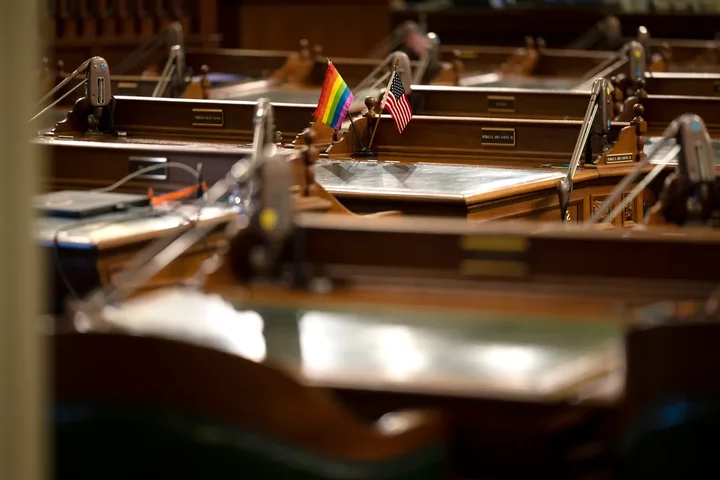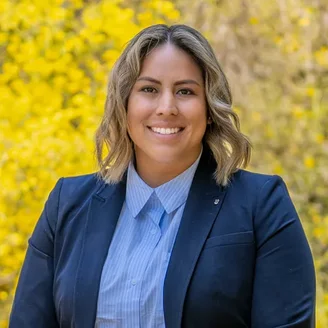The Assembly floor at the state Capitol on May 31, 2022. Photo by Miguel Gutierrez Jr., CalMatters
Leading up to Election Day, advocacy groups were predicting — or at least hoping — that California voters would elect record numbers of women and LGBTQ people to the Legislature.
Based on the results so far, it appears that history will be made — and that the state Assembly and Senate will look more like California than ever before.
With eight openly LGBTQ candidates winning, including four potential new lawmakers, plus four holdovers, the Legislature is on track to have at least 10% LGBTQ representation for the first time ever, according to Equality California. If that happens, California would be the first state to achieve proportional LGBTQ+ representation in its legislature — and the number could go as high as 14 of the 120 legislators.
And the number of female lawmakers is headed toward at least 43, a record, and as many as 52, according to Close the Gap California. This past session, women made up 39 of 120 legislators — up from a recent low of 26 seats in 2017.
The likely surge in diversity is partly due to new districts and open seats that created a window of opportunity for new candidates.
In the June primary, an unprecedented 113 women ran for legislative seats, 38% of all candidates, and 80 made it to November. In districts without an incumbent, 61% of female candidates advanced out of the primary — nearly double the success rate of 33% in 2020, according to Close the Gap, a political advocacy group that works to elect Democratic women. Nine legislative races on the Nov. 8 ballot featured two women running against one another, including Jasmeet Bains, a Democratic state Assembly candidate in Bakersfield, who would become the first South Asian woman in the Legislature.
“The reality is women win just as often as men when they run,” said Susannah Delano, Close the Gap’s executive director. “What we’re seeing now is more women running, therefore competing on the field and getting elected in equal numbers.”
Also this year, a record number of LGBTQ+ candidates ran for office in California — 178, more than any other state, according to the LGBTQ Victory Fund. That wasn’t by chance, said Samuel Garrett-Pate, managing director of external affairs for Equality California, a political advocacy and civil rights group. It spent the past two years working to recruit and support LGBTQ+ candidates, and pushing for new districts that would empower LGBTQ+ voters.
‘Representation is power’
More women in the Legislature will help shape policy priorities, which Delano believes will include reproductive health care, pay equity and family economic issues. More than half of the projected new class will be women of color, and the vast majority will be Democrats.
“Representation is power,” Tony Hoang, executive director of Equality California, said in a statement.
Garrett-Pate said that the shift in the Legislature will impact “any number of issues impacting the LGBTQ+ community.” This past session, the LGBTQ caucus successfully pushed landmark legislation to make California a refuge for transgender health care.
“There’s a lot of work for us to do to achieve full equality. It’s not as simple as just passing civil rights protections,” Garrett-Pate said. “It’s tough work that takes a long time, but we know that we can make greater progress when we have more people in the room helping make these decisions.”
In the new representation, there would be a host of firsts.
Those leading in their races include Palm Springs City Councilmember Christy Holstege, a Democrat who would become the first out bisexual woman to be elected to the Legislature, representing Assembly District 47.
There’s also Democrat Corey Jackson, about to become the first Black openly LGBTQ+ person elected, who is ahead in the Assembly District 60 race. A member of the Riverside County Board of Education and founder of a nonprofit focused on youth services, Jackson said he has a “double-marginalized perspective,” since African Americans are often also marginalized within the LGBTQ+ community.
He said his priority will be to uplift the “most historically marginalized and oppressed.” “California still has a humanity problem in which we believe that there are some of higher quality, some of lower, some thought of as more human than others,” Jackson told CalMatters. “My goal is to do my darndest to put a stop to that.”He also led the fight in Riverside County to declare racism a public health crisis. And the California Nurses Association is counting on his support for single-payer health care — a priority for progressives that has failed to make much progress in the Legislature.
Jackson said he faced numerous whisper campaigns that cast him in a negative light for his sexuality, but was able to overcome them because of his public service: “People don’t say, ‘Oh look, there’s Corey, he’s gay. They say, ‘This is Corey. He’s one of our leaders in the community. He’s one of our fighters or civil rights leaders.’”
Caroline Menjivar, who is leading in an all-Democratic race for a state Senate seat, would be the first ever out LGBTQ+ legislator to represent the San Fernando Valley. She’s also a military veteran and Salvadoran Latina.
She said her intersectional identities allows her to bring in “the voices of other groups” and look at issues “through other lenses.”
That’s been helpful, she said, in a race competing against Daniel Hertzberg, also a LGBTQ candidate and the son of outgoing state Sen. Bob Hertzberg. “The door was shut on me so many times,” Menjivar told CalMatters. “People didn’t want to give money because, well, ‘Bob is my friend. Well, you know, you’re running against my friend’s son. Oh, you know, Bob would be so mad at me, no.’ Everything was ‘Bob, Bob, Bob, Bob, Bob.’”
“Not once was it, ‘He’s a better candidate.…’ So it was as if I was running against an incumbent, without running against an incumbent.”
Menjivar plans to use her background as a social worker to try to increase the Medi-Cal reimbursement for mental health services and to address workplace burnout for mental health workers. She also intends to apply her experience of being evicted to addressing the state’s housing shortage.
“Legislators need to hear these stories, to be able to be pushed towards … a vote,” Menjivar said.
The increases in diversity from the 2022 election aren’t guaranteed to last, but could also grow.
Largely due to 12-year legislative term limits, enacted in 2012, Delano expects at least 24 seats to turn over in 2024, and another 20 in both 2026 and 2028. Senate President Pro Tem Toni Atkins of San Diego, the first openly gay Senate leader, is among those terming out in 2024.
Though women will have to wait for parity in the Legislature, Delano said this election is a “huge step forward.”
“Women are really just getting started,” she said. “We’re just beginning to see the kind of transformation that we’ll have.”
###
CalMatters.org is a nonprofit, nonpartisan media venture explaining California policies and politics.


CLICK TO MANAGE